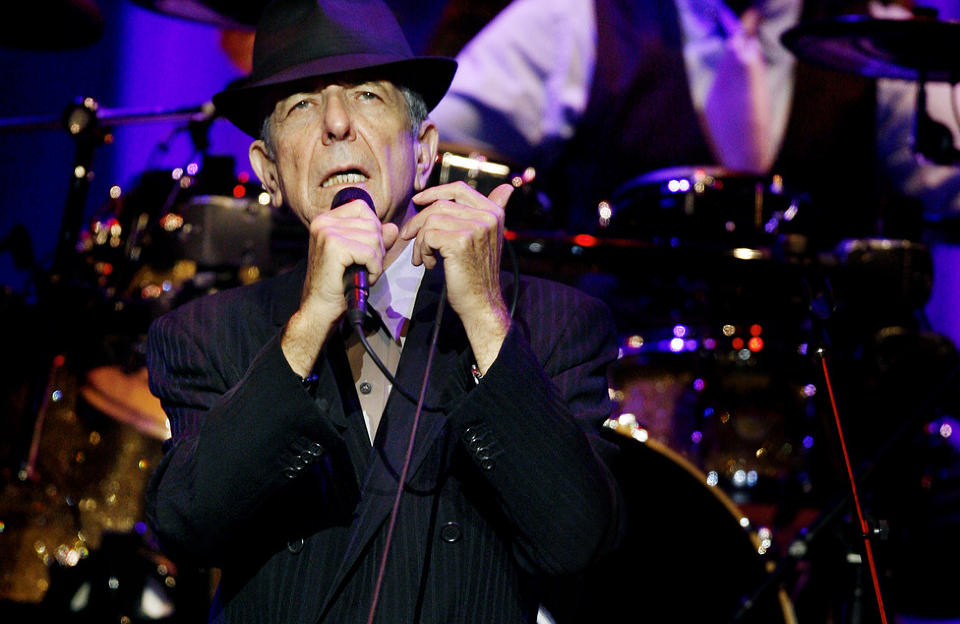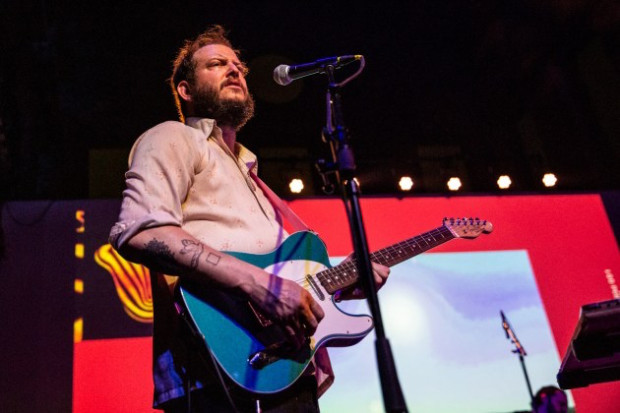
The Jaundiced Ear
Leonard Cohen is in the middle of another world tour. One can only say: what a man!
Or: how sad.
Two years ago he was in the west of Ireland.
A W.B. Yeats twilight hovered over one of his favourite places, Lissadell, County Sligo. The distant ensemble of musicians, so small onstage they looked like puppets to the outdoor audience, were barely discernible. Two moths caught in a spotlight began to dance. A voice sang:Oh let me see your beauty when the witnesses are gone Let me feel you moving like they do in Babylon…
Dance me to the end of love.
The amplified sound turned the moths into fireflies, boomed at 10,000 ant-like people. Most were rapt, others a continuous parade of pint-bearers to the left and loo-seekers to the right, as the principal puppet sang: ‘Like a bird on the wire / like a drunk in a midnight choir’. The irony was ignored, the urgent paraders and queuers only vaguely attentive to the venerable poet/minstrel on the distant stage.
Dusk intensified; the puppets were gradually seen to be playing and singing in perfect synchronism with giant figures on TV screens to left and right. Soon the darkness camouflaged both the dimly-lit puppets and also, blessedly, the parade of drinkers obstructing our view. We could transfer our gaze from the stage, relax into savouring the real thing: a live, closed-circuit TV broadcast of Leonard Cohen. Only the huge screens seemed real, the puppets merely miming. 100 metres separated us from the flesh and blood performers but we were seduced by the greater reality of the images on the screens – as, presumably, intended. But ‘Field Commander Cohen’ was still holding his own, the self-described: ‘...patron saint of envy and the grocer of despair’.
It was quality music: well-rehearsed playing; outstanding riffs by old and young pros; the solo performer genuflecting like a celebrant, doffing his hat in tribute to his ensemble, to his angelic trio of a backing choir. The audience was enthralled. I could already imagine it on Sky Arts 2.
At which thought I straightened up. There was a disjunction here. Between form and content. What was going on? I could be sitting at home in comfort looking at this on TV instead of wrestling with a bad back in a plastic chair. He sang on: ‘Everybody knows it's coming apart / Take one last look at this Sacred Heart / Before it blows / And everybody knows.’
Why had no print commentator warned me? All I had read was journeymen and women hyperboleying the occasion in their broadcheats — which coincidentally depend on expensive half-page spreads to publicise such commercial ventures as these. The back-story, which they had recycled endlessly, was that the Cohen of our youth, latterday Buddhist, had been robbed of his savings; the hint was that we should help an old friend in trouble. This was his third year collecting, repeating exactly the same programme, the same genuflections, the same hat doffing, from Oslo to Melbourne, from New Zealand to Pnomh Penh! Surely he had by now recouped enough at least for a pension? It was journalistic nonsense. Cohen doesn’t need us, materially or spiritually; we need him.
Other comments were merely ageist. They all marvelled rightly at the energy of the old man, the phenomenon of the performance, as if Leonard Cohen at seventy-four was akin to a circus dog that could talk. Matteradamn whether it made sense or not; the miracle was that it could still get up on its hindlegs and talk — and sing: ‘Because of a few songs / Wherein I spoke of their mystery, / women have been / exceptionally kind / to my old age.’ They always were. They still are and deservedly so.
If only there were a social philosopher at hand to answer my queries.
Why, for instance, would hundreds of thousands of adults pay exorbitant sums to be present at what is really a closed-circuit TV show? (My own alibi? I was the convalescent guest of a generous and beautiful old friend.) From what I could see of my fellows in Lissadell I was possibly the person next oldest to Leonard himself. The next candidate in line was the man in front of me who hadn’t the energy to clap, merely to raise both arms in silent adoration at the end of each song.
My mind wandered, as is my geriatric privilege, to a line from his ‘Closing Time’: ‘And I just don't care what happens next / looks like freedom but it feels like death.’
And then, bizarrely, Leni Riefenstahl, film-maker, came to mind. Perhaps my subconscious nudged me with the fact that in 1964 Cohen, coming from a tiny Montreal Jewish minority, had ironically entitled a collection of his poems Flowers for Hitler.
Remember Riefenstahl? She made classic films of the original Nuremberg rallies and the 1936 Olympic Games. Whether they were art or propaganda films, celebratory or warning, is irrelevant. They were overwhelming. She never made another decent film; her Nazi sponsors were vanquished. Why did I think of her? Did the larger-than-life screen images of talented musicians on this Lissadell stage remind me of her Goebbels-scale work?
I fear massed audiences, but how indelicate of me to align such opposite messages, separated by seventy years and sixty million dead. I realise that Kurt Vonnegut was right: old men are obscene and accurate! But consider dispassionately the technology, the very act, the size of the events in question. Both suggested we were tiny, powerless, lost, that our pain could be assuaged if we temporarily lost ourselves, became idolatrous followers. Followers of what?
Another Canadian ghost joined in these musings: Marshall McLuhan. His cliche resonated in my head: the medium is the message. The irony of it! An aged Jewish poet still singing songs of love, anguish and despair (flavoured by wonderful pinches of black humour and a rich invocation of Catholic pieties) separated by seventy years from a raging anti-Semite preaching revenge for the Treaty of Versailles but — and here is the point — both using exactly the same pyrotechnical principles of showbusiness: amplification, gigantism, Goebbels’ big lie (repetition), Barnum’s dictum about never going broke underestimating public taste. To me, what Cohen said or sang was becoming blurred in the hugeness of the presentation, despite the fact that, on a personal note, long ago at Christmas 1967 in his hometown Montreal, his just-issued first record, Songs of Leonard Cohen, became my soundtrack to a love affair worthy of the maestro himself.
Cohen is a year older than me. I still love many of his original songs, ‘Suzanne’, ‘Sisters of Mercy’, ‘Who By Fire’ et alia. Even though this night his voice was reduced to a few rich-as-Robeson bass notes, even though he had no higher register left, even if there was a mantra-like sameness to his melodies, I ached as he sang them again. The poet in him, his lyrics, were what always seduced us. But this was different: the packed amphitheatre mocked the whole point of his persona of intimacy. ‘Yeah, you who must leave everything that you cannot control. / It begins with your family, / but soon it comes ‘round to your soul.’
At this point I had to seek real pain-killers (as usual, I had lost my prescription and on medical advice must not anaesthesize myself with alcohol). So superb was the military (hmm) precision of this occasion, I had little difficulty excavating the young doctor on duty from the portaloo crowd. No problem, he said, when I mentioned recent surgery, and he agreed to give me the required medicaments.
‘I’d say you’ve been kept busy this weekend, especially with Westlife on Friday night,’ I sympathised with him.
‘Not at all,’ he replied. ‘In fact it’s this Cohen crowd which has me run off my feet.’
‘What!’
‘Yes. Elderly people trying to recapture their youth. Drinking amounts that they might have been able to absorb in the past. But no longer.’ He spoke kindly.
The beer stalls, burger joints, oyster counter and coffee dispensers still did a roaring trade. Meanwhile the queues for the portaloos raced the shadows. At the interval I met a handsome young woman of my acquaintance. ‘I want to bop,’ she complained, ‘but not on my own.’ I realised I had seen nobody dancing.
Another interpretation: the Supermarket culture, LIDL, IKEA, M&S, B&Q, the mall experience has wiped out the old intimacies of the small community. It has closed the corner shops and little post offices, opened drink emporiums, turned us into domestic alcoholics. But we are social animals, are nothing without social intercourse. The nuclear family is no longer enough. The recording for TV of open-air gigs like Riefenstahl’s, the Beatles, Live Aid, U2’s Zoo TV tour, Yevtushenko’s poetry masses in the sixties, Pope John Paul’s 1979 hysteria in the Phoenix Park, Dublin, and yes, tonight, Cohen’s, have one thing in common: providing a placebo for the human need of communality — the very need that Goebbels cashed in on. The music is secondary, anticipation of the spectacle everything. The Beatles learned this, feared it, retreated from the mob hysteria to the studios. At least Leonard has the grace to spend much of his time going down on one knee, seeming to beg our forgiveness, our absolution for the grossness of the overwhelming technology and commercialism which diminisheth even him.
In peace as much as war, wherever there is money to be made, we become a technologically manipulable outdoor mass, not just of teenagers or soccer fanatics, but of all who are in need of the reassurance of shared human experience, the camaraderie of our species. The condition embraces all classes and ages, has extended to the disappointed middle-aged and old. Lose me in the crowd, take me out of myself, save me from my life. Give me parables. Expense no object. I suppose, in a way, this is preferable to war.
Leonard Cohen once put music to a minor piece by my all-time favourite Canadian poet, F.R. Scott. I wish Cohen had set the following Scott poem, ‘To Certain Friends’:
They make a virtue of having an open mind…
…to the rain of facts that deepens the drought of the will
… Till one day, after the world has tired of waiting,
While they are busy arguing about the obvious,
A half-witted demagogue will walk away with their children.
Lissadell made me believe that we are ripe for another despot. Is the rough beast’s hour come round at last?
If so, it certainly won’t be that decent and gentle old minstrel, Leonard Cohen; I can’t see him slouching towards Bethlehem to be born, not even in a Popemobile. I hope he confines himself to the acoustic guitar. And no cameras, lights, action, please.
Just a couple of fireflies.
Published on 24 September 2012
Bob Quinn is a film-maker and writer. Visit conamara.org













